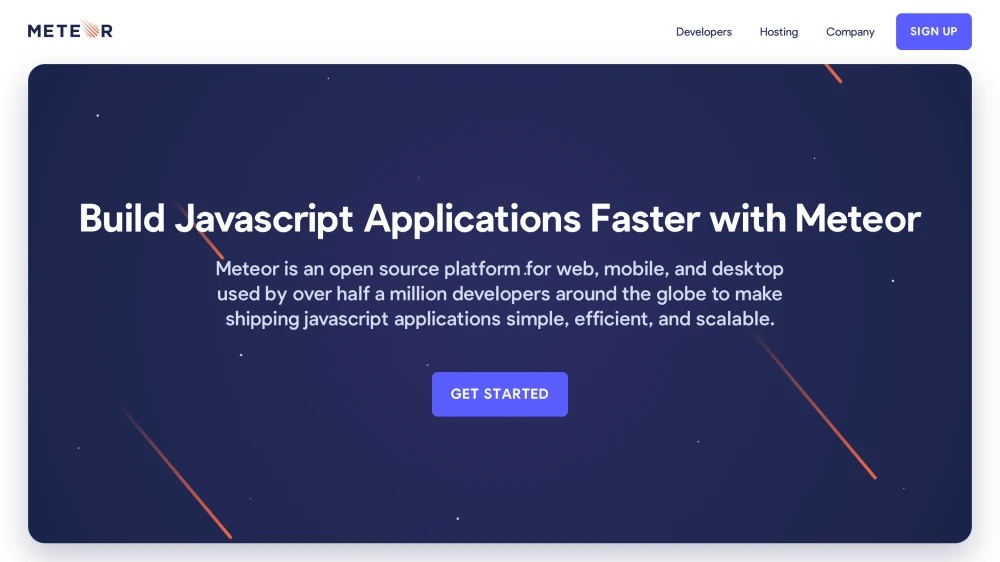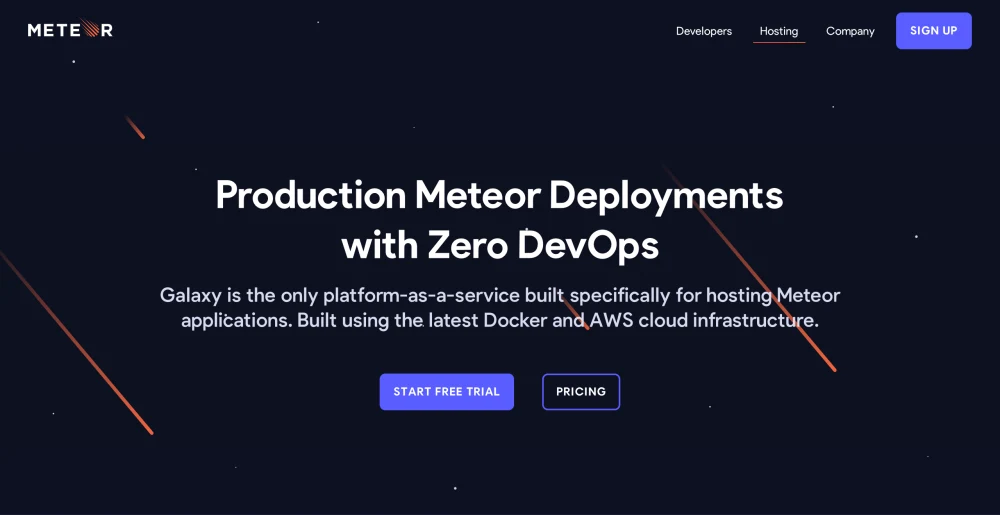In 2022, Meteor is not dead. It is getting back in the game after some slowdown, and it is ready to rock the development world.

What Is Meteor JS and Why Does Everyone Say That It Is Dead?
Meteor is a JavaScript web framework, which fully corresponds to its name. Like a true meteorite, it shone very brightly before it plummeted. At least, that is what most people think.
Here at Keenethics, we have been watching Meteor almost since it was introduced in 2012, and we love it! We had huge hope for this meteorite to turn into a shining star, and we did our best to support this framework. Yet, in 2018–2019, it started losing its positions in popularity charts. On April 3rd, 2019, the 1.8.1 version was released. Yet, shortly after, most people would say that Meteor was dead. But our technical team did not lose hope, so we kept going with Meteor JS development and waiting for this framework to reappear.
In November 2019, things started slowly moving. We have noticed that the Meteor team redesigned their website and started releasing regular updates on a monthly basis. Today, we enjoy version 1.10 released on March 12th, 2020. Meteor regained its shining, and it is not going to stop.

Whatever one would say, Meteor is not dead. It did have a brief slowdown because of some changes inside the company. But when it was purchased by Tiny Capital in 2019 — a family of companies, which also owns Dribble and Unicorn Hunt, — the Meteor js framework received a chance to revive.
In 2022, Meteor is not dead. It is getting back in the game after some slowdown, and it is ready to rock the development world.
Why Should You Develop Your Next Web App With Meteor?
The primary advantage of Meteor framework is hidden inside its name. Did you know that, after entering the Earth atmosphere, meteoroids can travel at an astonishing speed of 11 to 72 kilometers per second (25–160 thousand miles per hour)?
Meteor as a framework is also incredibly fast. With Meteor, it is possible to launch an MVP web development product in only 3 or 4 weeks (depending on the project scope, of course). The speed of it stems from the seven benefits listed before:
- Convenience
- Reactive UI
- Simple deployment
- Extensibility
- Popularity
- Low learning curve
- A single language for the entire project
One: Meteor is convenient
The first reason why developers love working with Meteor.js is the convenience it offers. The development becomes more comfortable and, therefore, faster. In particular, Meteor offers a perfect synchronization opportunity: all the data is synchronized in real-time, which greatly facilitates collaboration on a project. It has a built-in feature of LiveReload, which lets you see all the changes you develop without rebuilding the project or refreshing the browser page. Also, Meteor gives full freedom regarding the project structure — there are recommendations, but there are no obligatory rules.
Meteor requires less code, which translates into fewer bugs, less time spent on development, and higher quality.
Two: Meteor is reactive
The second reason why Meteor js is often praised rests in its reactive UI. This concept presumes a rapid automatic change of the user interface with each change in data. In simple terms, for example, once somebody posts a comment under your article, you can see it immediately, without reloading the page. From the user’s standpoint, reactive UI is a must because nobody wants to reload the page to see the latest updates. Each user wants to see the immediate effect after they pressed a certain button, selected a filter, or opened the menu. Without a reactive UI, a website cannot be responsive and user-friendly.
While reactive UI is offered by many frameworks, each one implements it in a different way. There are still a lot of frameworks and programming languages that do not support this feature. So, reactive UI is an advantage, not a usual thing, and Meteor implements it in an effective way — this feature is relatively simple to develop and it does not affect website performance.
Three: Meteor is easy to deploy
Deploying a web app is easier than deploying a mobile app but still can cause a great deal of headaches. Meteor offers a way to facilitate this process. This framework is augmented with Galaxy — a PaaS solution for hosting Meteor js apps, which runs on Amazon AWS.

This hosting platform significantly reduces the time spent on deployment and DevOps. All it takes to deploy an app is to sign into Galaxy, add some environmental variables to the setting file, and enter a single line of code:
The deployment process becomes effortless, and you can debug and manage your app when it is already in production.
Such a solution is offered on the official Meteor page in the Deployment guide, so it is not a “detour”, it is an official path. The developers of Meteor apps who use Galaxy admit that this solution enabled them to save about 40 hours each month.
Four: Meteor is extensible
Meteor is great not only because it has a lot to offer but also because it can be easily integrated with tens and hundreds of other solutions. In particular, there is a large database of Meteor extensions, which is maintained by the Meteor community, — Atmosphere.js. There are a lot of smart packages, which can help you save a lot of development time. For instance, instead of building a login screen from scratch, you use a Meteor package. As of April 2020, it features 14,079 various packages.

Also, you can easily integrate Meteor with various JavaScript libraries, like React or Bootstrap. To quickly turn a web Meteor application into a mobile one, you can use Cordova — the two technologies are fully integrated with each other.
Five: Meteor is popular
The fourth reason to choose Meteor is the community supporting it — it is large and growing. First of all, this community helps to develop the framework. The version 1.10, which features a lot of important improvements with Cordova, MongoDB, skeleton, Galaxy, and DevTools, was developed with a huge help from over 40 community developers. Secondly, the community supports each individual developer. If you are a developer and cannot find information on the official Meteor website, you can reach out to the community on Stack Overflow or Reddit — they will answer your queries. For you as for a business owner, there is also an advantage. If for some reason you have to end cooperation with your current development team, you can easily find a substitute for your Meteor developers.
Six: Meteor is easy to learn
Meteor is super easy to learn. It is a great choice for developers-to-be, who would like to start learning programming, and for developers experienced in languages other than JavaScript, who would like to master JS as well. Most JS developers would say that Meteor is one of the easiest (if not the easiest) framework to learn. The documentation is well-detailed and often updated. The code in Meteor is relatively simple and efficient, and it has to follow no strict structural rules. As mentioned before, Meteor apps are easier to deploy. Also, the community support listed in the former paragraph is critical for one to succeed in learning to code. After all, as a business owner passionate about technology, you can quite easily grasp the basics of Meteor to perfectly understand the app yourself.
To study Meteor, there are a lot of courses available on Udemy and Evented Mind, tutorials on Hackr.io, and informative articles on Medium. You can also check Meteorpedia, which features a lot of useful materials for Meteor development. The official YouTube channel on Meteor is a great place to learn about Meteor development tips, tools, techniques, and examples. Finally, there are two tutorials featured on the official website: one for a simple To-Do Meteor application and one for a clone of WhatsApp.
Seven: Meteor lets you use a single language for the entire project
Meteor is claimed to be suitable for both front end and back end development of web, mobile, and desktop applications. However, developing the entire application for multiple platforms only with Meteor is not the most rational choice. Most developers would use it only for the back-end of web apps.
Yet, Meteor lets you develop the entire project with a single language — JavaScript. For the back-end of the web app, you have chosen Meteor. For front-end, choose React. For a mobile application, integrate your project with Cordova or React Native. For a desktop app (do you really need it?), use Electron. To connect these mobile and desktop apps with your Meteor back-end, use DDP (Distributed Data Protocol), which is solely Meteor’s feature. Now, your entire project is built with JavaScript.
So, What Is Next?
Meteor is not dead. It is up and running again, and it has a bright future ahead of it. Learning Meteor and developing apps with it definitely makes a lot of sense.
- If you are an experienced JavaScript developer, you should give Meteor a chance — you will certainly enjoy how fast and convenient the development process is.
- If you are a developer experienced in any language other than JavaScript but would like to master this language as well, Meteor.js is a perfect entry point for you. You will enjoy the opportunity to create an entire web application, both client-side and server-side, with a single language.
- If you are relatively new to programming, JavaScript is a way to go, and the Meteor web framework is the easiest approach to it.
- If you are a business owner, Meteor is perfect for the tech stack of your app. It will let you save on development time and costs. If something goes wrong with your original Meteor web development team, you will easily find a substitute. Also, if you would like to start with prototyping, Meteor should be the fastest way to implement it.
So, do not hesitate to give Meteor a shot. And if you encounter any troubles with Meteor web development, we will be happy to help.
We have been watching this framework since it was introduced, and we kept watching it when everyone thought it was at a standstill. We believe that our experience can be of great use to you.

























